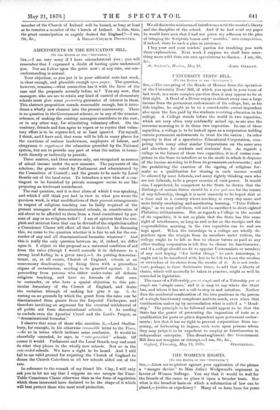UNIVERSITY TESTS' BILL.
[To THE EDITOR OF THE "SPECTATOR:1 SII2,—The excepting of the Heads of Houses from the operation of the University Tests' Bill, of which you speak in your issue of last week, is a more complex question than it may appear to be at first sight. A Head of a House enjoys in almost every case a large income from the permanent endowments of his college, but, as his title implies, he ought to be to a considerable extent dependent also upon the fees paid by the students receiving education in his college. A College stands before the world in two capacities, which are very often very confusedly mixed up, as are also the revenues accruing to it in those two capacities. In one of these capacities, a college is to be looked upon as a corporation holding certain permanent endowments in trust for the nation ; its other capacity is that of a speculative Educational Corporation, com- peting with many other similar Corporations on the same area and elsewhere for students and students' fees. As regards a college in the former of these two capacities, it is,of course com- petent to the State to interfere as to the mode in which it disposes of the incoMe accruing to it from its permanent endowments ; and the prohibiting the exaction of the signing of religious for- mulx as a qualification for sharing in such income would be allowed by most Liberals, and many rightly thinking men who are not Liberals, to be a proper exercise of such power. It would also, I apprehend, be competent to the State to decree that the discharge of certain duties should be a sine qua nun for the tenure of any fellowship, though it is most sincerely to be hoped that at a time and in a country where teaching is every day more and more fatally overlaying and smothering learning, "Prize Fellow- ships," as we may call them, will not be sacrificed to short-sighted Philistine utilitarianism. But as regards a College in the second of its capacities, it is not so plain that the State has this same right of interference, so long as and so far as the receipts and the responsibilities accruing in the two capacities can be and are kept apart. When the tutorships in a college are wholly de- pendent upon the receipts from its members under tuition, the college ought to be left as free to choose tutors so paid as any other trading corporation is left free to choose its functionaries ; and if a college should sue fit to appoint Universalists or members
of any sect hoping "for better things" to such tutorahips, it ought not to be interfered with, but to be left to learn the wisdom or unwisdom of its choice from the results of it. It is not irrele- vant, perhaps, in these doctrinaire times, to add that a liberty of choice, which will assuredly be taken in practice, might as well be conceded in legislation.
The cases of a Fellowship par et simple and of a Tutorship par et simple are "simple cases," and it is easy to say where the State has, and where it has not a call to step in and interfere. Neither does the accidental combination of the two positions in the person of a single functionary complicate matters much, even when that combination makes up by accumulation what is called a "head- ship." The principle to be followed would appear to be that the State has the power of preventing the imposition of tests as a qualification for posts or prizes dependent upon permanent endow- ments; but that it has no right to prevent corporations from im- posing, or forbearing to impose, such testa upon persons whom they may judge it to be expedient to employ as functionaries in independent enterprise. This disentanglement the Government Bill does not recognize or attempt.—I am, Sir, &c.,
Oxford, Thursday, May 19, 1870. OXONIENSIFS.






























 Previous page
Previous page